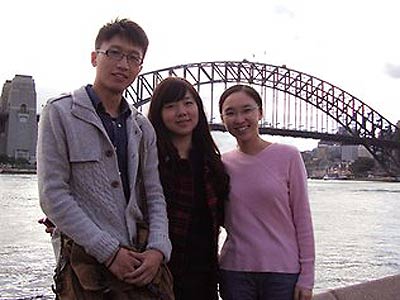
English is no longer alien in the world's most populous country, with the language in common use from Beijing boardrooms to the back streets of Baoshan.
在中國(guó)這個(gè)世界人口最多的國(guó)家,英語(yǔ)對(duì)人們來(lái)說(shuō)不再陌生,從北京的會(huì)議室,到云南保山的小巷,英語(yǔ)隨處可見(jiàn)。
But it's not the same as conversing with native speakers, according to two winners of a big English language competition for undergraduate students in China.
但對(duì)于從中國(guó)大學(xué)生頂級(jí)英語(yǔ)演講賽事的走出來(lái)的兩位獲獎(jiǎng)?wù)叨裕c那些母語(yǔ)是英文的人交流卻完全是另外一回事。
"We say, ‘long time no see!'" says Shen Jiahui, 20, who placed second in this year's 21st Century Cup competition.
"我們說(shuō),‘long time no see!(好久沒(méi)見(jiàn))'。"獲得 本屆21世紀(jì)杯英語(yǔ)演講比賽一等獎(jiǎng)第二名、20歲的沈家慧說(shuō)道。
"That's Chinglish. People are not speaking like this [any more]."
"那是中式英語(yǔ)。現(xiàn)在人們不再這樣講了。"
Ms Jiahui is on a study tour of Sydney with fourth placegetter Wang Taojun, courtesy of competition sponsors Navitas English.
沈家慧以及獲得本次大賽一等獎(jiǎng)第四名的選手王陶鈞正在進(jìn)行悉尼游學(xué)之旅。此次行程由大賽贊助商——澳大利亞Navitas英語(yǔ)集團(tuán)慷慨支持。
This year's competition attracted nearly 10,000 entrants from 850 universities in China and others in Hong Kong, Macau, Taiwan, Thailand, South Korea and Japan.
本屆大賽共吸引了近萬(wàn)名選手參加,他們分別來(lái)自中國(guó)大陸850所高校、港澳臺(tái)地區(qū)以及泰國(guó)、韓國(guó)和日本。
Now in its 18th year, the competition was established in the wake of Beijing's failed bid to stage the 2000 Olympic Games.
如今是大賽開辦以來(lái)的第18個(gè)年頭,當(dāng)年北京在申辦2000年奧運(yùn)會(huì)時(shí)失利, 此后"21世紀(jì)杯"全國(guó)英語(yǔ)演講比賽應(yīng)運(yùn)而生。
"One reason Beijing failed was that there were not many English speakers at the time," says Shen Gang, deputy editor in chief of the English language newspaper 21st Century.
"北京申奧失利的原因之一便是當(dāng)時(shí)說(shuō)英語(yǔ)的人還不是很多。"《二十一世紀(jì)英文報(bào)》副總編輯申鋼說(shuō)。
He says the competition was created to encourage Chinese university students "to open their mouths and use English as a language for communicative purposes, not as a language only learnt in classrooms".
他表示,該項(xiàng)賽事旨在鼓勵(lì)中國(guó)大學(xué)生"開口說(shuō)英語(yǔ),并把英語(yǔ)當(dāng)成一種交際性語(yǔ)言來(lái)使用,而不僅僅限于課堂學(xué)習(xí)。"
China now has more people learning English as a second language than any other country, Mr Gang says, with lessons mandated from the third year of primary school.
申鋼表示,比起世界上其他國(guó)家而言,中國(guó)現(xiàn)在有更多的人把英語(yǔ)當(dāng)做第二語(yǔ)言來(lái)學(xué)習(xí),小學(xué)三年級(jí)便要求開設(shè)英語(yǔ)課。
But in practice this only happens in the cities because there aren't enough English teachers in rural areas. And the vast majority of teachers are Chinese-born.
但實(shí)際上,目前僅僅在城市中做到了這一點(diǎn)。因?yàn)檗r(nóng)村地區(qū)的英語(yǔ)教師十分缺乏。而且大部分教師都是土生土長(zhǎng)的中國(guó)人。
"There's a term called ‘mute English' in teaching and learning cycles," Mr Gang says.
申鋼表示:"在教學(xué)圈中,有一個(gè)術(shù)語(yǔ)叫做‘啞巴英語(yǔ)'。"
"A lot of students can only read instead of open their mouths and communicate with English. The [main] reason is there are not many foreign language teachers in China.
"很多學(xué)生只會(huì)讀,而不會(huì)開口用英語(yǔ)交流。主要原因在于中國(guó)并沒(méi)有很多的外語(yǔ)教師。"
"Most English major students get their first native speaker teacher when they reach first year in university."
"很多英語(yǔ)專業(yè)的學(xué)生在大一時(shí)才有了第一位母語(yǔ)是英語(yǔ)的外教。"
He says learners use tapes and videos to imitate pronunciation and intonation.
他提到,很多學(xué)習(xí)者通過(guò)聽磁帶、看錄像來(lái)模仿語(yǔ)音和語(yǔ)調(diào)。
"That's one reason President Barack Obama is very popular with teenagers, because people can download his speeches for his pronunciation."
"這就是為何美國(guó)總統(tǒng)巴拉克•奧巴馬在青少年中頗受歡迎的原因之一,因?yàn)槿藗兡軌蛳螺d他的演講資料學(xué)習(xí)發(fā)音。"
Mr Gang says English now dominates as the foreign language of choice and the only one required by the Chinese Ministry of Education.
申鋼說(shuō),如今英語(yǔ)成為學(xué)習(xí)外語(yǔ)的首選語(yǔ)種,也是唯一一門經(jīng)中國(guó)教育部規(guī)定的外語(yǔ)必修課。
"French, German, Japanese, Russian, Spanish and others – these languages are regarded as third languages, but English is always second."
"法語(yǔ)、德語(yǔ)、日語(yǔ)、俄語(yǔ)和西班牙語(yǔ)等等,這些語(yǔ)言被視為第三語(yǔ)言,而英語(yǔ)一直是第二語(yǔ)言。"
He says young people have started to mix Chinese and English as "kind of a fashion trend". The term "nihao are you?" – a fusion of the English greeting with the Chinese nihao – is commonly used in Beijing, especially to address foreigners, after it was popularised by a Radio China International announcer.
他表示,年輕一族開始把中、英文混雜作為"一種潮流"。現(xiàn)在北京有種說(shuō)法十分流行,尤其是在和外國(guó)人講話時(shí)被廣泛使用,那就是:"nihao are you?",其中將英文問(wèn)候語(yǔ)與中文"你好"融合起來(lái),該說(shuō)法此前曾被中國(guó)國(guó)際電臺(tái)的一位播音員大力推廣。
Mr Taojun, who prefers the name Daniel while in Australia, is studying translation and interpretation as a third-year student at Sichuan International Studies University.
在澳大利亞,王陶鈞更喜歡用丹尼爾這個(gè)英文名字,他現(xiàn)在在四川外語(yǔ)學(xué)院讀大三,專攻翻譯與口譯。
"English is a little bit like the working language in multicultural working environments," says Daniel, 21.
21歲的丹尼爾說(shuō):"英語(yǔ)有點(diǎn)像多文化工作環(huán)境中的工作語(yǔ)言。"
"In big companies, many documents are in English. So young people who want to find a better job in giant companies, they'd better speak good English."
"在大公司中,很多文件都是英文的,所以那些想在大公司中找到好工作的年輕人最好能說(shuō)一口流利的英語(yǔ)。"
Daniel and Ms Jiahui, who go by the names of Lily, are on their first trip outside China. They're attending English classes between visits to Sydney's tourist attractions.
對(duì)于丹尼爾和莉莉(沈家慧的英文名)來(lái)說(shuō),這是他們第一次出國(guó)旅行。他們?cè)谙つ嵊^光之余也參加了英語(yǔ)課學(xué)習(xí)。
"The teaching method here is quite different from what we have in China," says Lily, a second year international business student at Guangdong University of Foreign Studies.
"這里的教學(xué)模式和我們?cè)谥袊?guó)所接受的大不相同。"來(lái)自廣東外語(yǔ)外貿(mào)大學(xué)國(guó)際貿(mào)易專業(yè)大二年級(jí)的莉莉表示。
"Teachers have more interaction with the students, and the students are engaged in the whole process. It's quite different."
"師生間的互動(dòng)更多,學(xué)生參與到整個(gè)環(huán)節(jié)之中,與國(guó)內(nèi)完全不同。"
Daniel says the local courses explore topics never covered in China, such as the history of pop music. He says the students are from all over the world and are forced to use English because it's the only common language.
丹尼爾說(shuō),悉尼的課程探究了許多此前在中國(guó)從未涉及的話題。比如流行音樂(lè)史。他說(shuō)學(xué)生來(lái)自世界各地,他們必須使用英語(yǔ),因?yàn)檫@是唯一的通用語(yǔ)言。
The total immersion continues after class, with many students staying in homestays. Lily says chats with her host family have improved her proficiency.
很多學(xué)生都住在當(dāng)?shù)氐募乃藜彝ブ校@樣一來(lái)課下時(shí)大家依舊完全沉浸在英語(yǔ)環(huán)境之中。莉莉表示與寄宿家庭聊天提高了自己英文的熟練程度。
"You don't learn [some] words from your books or academic English. You can only learn from daily interaction."
"有些詞是你從書本或課堂中學(xué)不到的,你只能從日常交流中汲取。"


